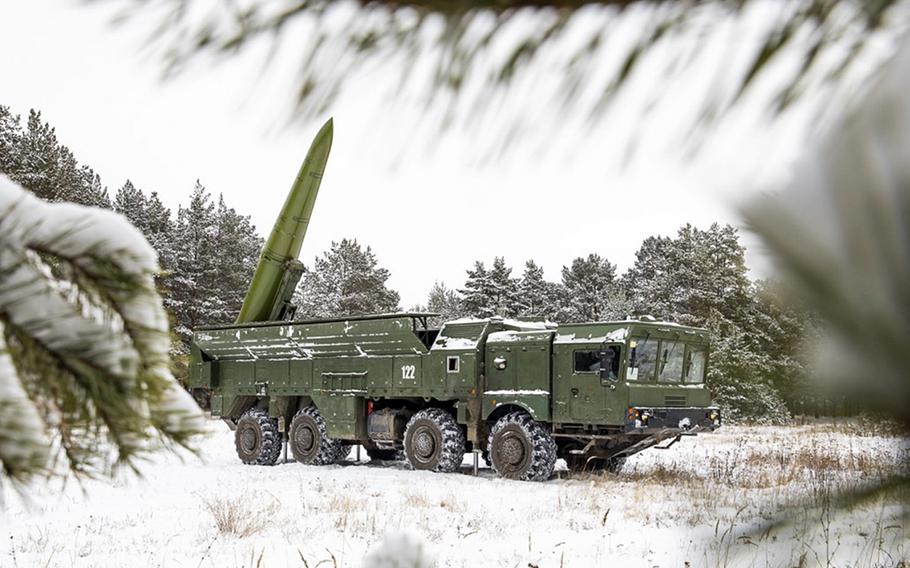
A Russian Iskander short-range ballistic missile system during military exercises in 2019. Tactical nuclear weapons are likely to play a larger role in Russia's strategy for countering NATO, according to a new study authored for U.S. European Command by the International Institute for Strategic Studies. (Russian Defense Ministry )
STUTTGART, Germany — Shorter-range nuclear weapons are likely to play a larger role in the Kremlin’s strategy against NATO, given the struggle of Russian conventional forces on the battlefield in Ukraine, a new U.S. European Command-sponsored study argues.
The study comes after repeated nuclear saber-rattling by Moscow. It was released Monday and had been sought by EUCOM to shed light on scenarios in which Russia could use nuclear weapons.
“Russia’s losses in Ukraine have undoubtedly shifted the pendulum away from high confidence in its conventional, non-nuclear strategic capabilities towards a growing reliance upon (non-strategic nuclear weapons) to deter and defeat NATO in a potential future conflict,” the International Institute for Strategic Studies report said.
In localized conflicts such as the one in Ukraine, Russia is unlikely to follow through on its nuclear threats so long as outside forces don’t intervene, according to the report.
Moscow’s calculus is likely to change, however, if the U.S. became involved in a “local or theater conflict.”
“Russia probably would use (non-strategic nuclear weapons) at the theater level to ‘soberize’ the West into realizing that it should settle the conflict as quickly as possible, preferably on Russia’s terms,” the report said.
Factored into that is a perception that the West lacks the will to use nuclear weapons in a like manner or tolerate large numbers of casualties, the report said.
“A particularly concerning development, from the perspective of the West, is Russia’s belief in its ability to gain and maintain escalation dominance, as well as absorb personnel and materiel losses to a degree unimaginable to the West,” it said.
The analysis, authored by nuclear arms expert William Alberque, focused on how non-strategic nuclear weapons could factor into Russian battle plans.
Unlike strategic nuclear weapons built for long-range strikes against the United States, Russian non-strategic weapons travel short and intermediate ranges.
They also can employ smaller warheads for tactical use on the battlefield, delivering damage in a more concentrated area than their strategic counterparts.
The Russia-Ukraine war has elevated concerns about the potential for nuclear conflict. Various Russian officials, including President Vladimir Putin, have issued warnings that have raised alarm.
While the U.S. and its allies in NATO have repeatedly stated there is no circumstance in which its forces would directly join Ukraine’s fight, some analysts have fretted that the delivery of arms to Ukraine could risk a nuclear escalation should Russia be faced with defeat.
Sergei Karaganov, the head of Russia’s Council on Foreign and Defense Policy, who has close ties to the Russian political leadership, gained attention in June when he authored an article calling for a pre-emptive nuclear strike against an unspecified ally of the U.S. in Europe that was supporting Ukraine.
Karaganov’s ideas sparked widespread debate in Russia on a scope and scale that surprised many in the West, the report said.
He theorized that such a strike would stifle U.S. willingness to arm Ukraine, paving the way for Russia to prevail in what it sees as a proxy struggle with the West.
Unlike their Cold War counterparts, most senior U.S. civilian and military leaders today haven’t needed to master the intricacies of nuclear deterrence, which was a linchpin of American relations with the Soviet Union.
Going forward, the U.S. and its allies should dedicate more resources to understanding Russian military thought related to non-strategic nuclear weapons, which will lead to better deterrence of Russia, according to the report.
“Understanding Russia and maintaining deterrence vis-a-vis Russia are a matter of survival for the West,” it said.